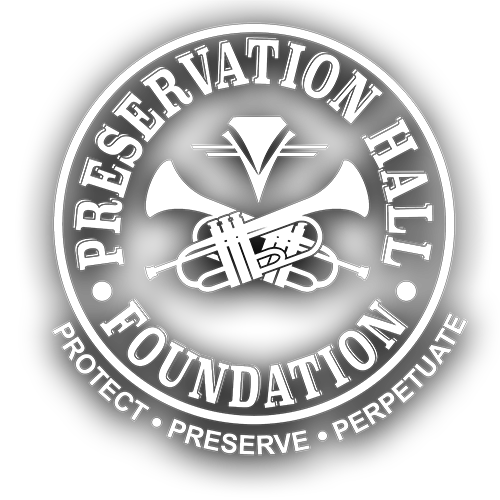Oral Histories
With support from the Tulane Music Rising Program, the Preservation Hall Foundation is proud to present its Oral History and Courtyard Conversations series. This series showcases members of the Preservation Hall musical collective, telling their venerable stories -- the way they learned music, the kind of musical community that helped to form them as artists and humans, and the role music plays in their everyday lives -- that are critical parts of New Orleans' jazz traditions.
Mr. Maynard Chatters
“When we think of jazz and how it started, the brass bands are really your first bands. The inception of New Orleans jazz started back around 1890-1900. Tuxedo, the Olympia, Onward Brass Band. All those bands that started back around that time. I heard that music all my life, for the funerals and all the social events. Bands played up and down the streets. This was a normal thing in New Orleans.”
—Maynard Chatters, trombonist and educator
As a young man, Maynard Chatters used to come by [Preservation Hall] to listen to the Humphrey brothers after finishing a gig. Maynard Chatters taught music at Dillard University for over thirty years. During his time there, he taught many of the musicians playing in and around New Orleans today. Besides being a great trombonist, Mr. Chatters is a wonderful vocalist.
Maynard comes from a large musical family: he has four brothers and eleven sisters. They all play music, and they all started out on violin. Recently, the Chatters family was honored with a family concert. Mr. Chatter’s entire family was in attendance, from great-grand children to great-grandparents. Nowadays, Maynard can also hear his son Mark playing trumpet at Preservation Hall. Sometimes, they even perform together!
To read Maynard Chatters’ definitive bio, please visit Salon726.com.
Mr. Joe Lastie, Jr.
Receiving his first drum set at age eight, Joe Lastie was destined to carry on the traditions of his highly musical family, which included his mother, both grandfathers, his aunt Betty, and his uncles Melvin, David, and Walter “Popee.” Born and raised in the Lower Ninth Ward, Joe’s grandfather was a minister and is credited with popularizing the drum set in church music. As a youth, Joe would set up a small drum kit at the foot of his grandparents’ bed and practice on whatever drums were available. “It didn’t matter if it was just a snare drum and cymbal,” he remembered, “I’d always find a way to make it work out.”
Lastie played his first job with a rhythm section backing the Desire Community Choir. He also studied jazz with Willie Metcalf at the Dryades Street YMCA, where his classmates included the young Wynton and Branford Marsalis. In 1969 he moved with his family to New York, where he took lessons from Clyde Harris through the public schools. His drumming improved enough to earn him a gig with the pit band for the New Orleans Broadway musical One Mo’ Time. Lastie returned to New Orleans after high school and picked up a steady gig with bassist Richard Payne’s band. On a tip from trumpeter Gregg Stafford, Lastie was invited to substitute at Preservation Hall in 1989; he has been a regular drummer with the band since then.
To read Joe Lastie's definitive bio, please visit: http://www.preshallblog.com/home/2016/8/4/joe-lastie-jrs-biography
Mr. Ernie Elly
Ernest Anthony “Ernie” Elly Sr. was born in 1942 in New Orleans’s Sixth Ward. Raised in a musical family, he received his first formal training from Yvonne Bush, the band director at Joseph S. Clark High School. After graduating, Elly joined the Air Force and performed in the Air Force band, but he wanted to play some “shake-your-booty” music. After he left the military, he got his chance to play with the Storyville Jazz Band, which included George and Bob French, Ellis Marsalis, Ralph Johnson, and Teddy Riley. “Boy, that was really fun! We used to play all kinds of different music, you know. We’d play rhythm and blues, country and western, traditional, you know, shake your booty.” Elly loves playing a wide variety of genres. He recounts, “One day I played about four gigs, and each gig was a different type of music. I was proud of that, you know. I’ve played with many very fine musicians from around the world and have much respect and fond memories from performing with them,” he says, “but I prefer performing with New Orleans musicians at home. The approach and feeling is entirely unique to New Orleans.” Elly has been playing in and out of Preservation Hall for more than thirty years.
To read Ernie Elly's definitive bio, please visit: http://www.preshallblog.com/home/2016/9/6/ernie-elly-a-definitive-biography-by-holly-hobbs
Mr. Freddie Lonzo
Second line parades drew Frederick “Freddie” Lonzo to music as a young boy in Uptown New Orleans. He joined the school band, directed by Mercedes Stamps, who influenced him greatly. As a teenager, he played trombone professionally, marching in parades with E. G. Gabon’s and Doc Paulin’s bands. While attending Xavier University, Lonzo played in dance bands, including the Gladiators, and began performing jazz with Paul Crawford’s band, Bob French’s Storyville Jazz Band, the Heritage Hall Band, and Harold Dejan’s Olympia Brass Band. Lonzo began playing at Preservation Hall in the mid-1980s with Percy Humphrey, Kid Sheik, Alonzo Stewart, Manny Crusto, Frank Fields, and trombonist Waldren “Frog” Joseph, who strongly influenced him. He also studied the styles of trumpeter Teddy Riley, tailgate trombone stylist Kid Ory, and trombonist Wendell Eugene—who blew his horn so loud that you could hear him two blocks away. These days, Lonzo is influencing younger musicians like trombonist Corey Henry. “You learn something from everybody you’ve been around and seen and talked to,” says Lonzo. “Good or bad, you learn something.”
To Read Freddie Lonzo's definitive bio, please visit: http://www.preshallblog.com/home/2016/10/4/freddie-lonzo-a-definitive-biography-by-alison-fensterstock

